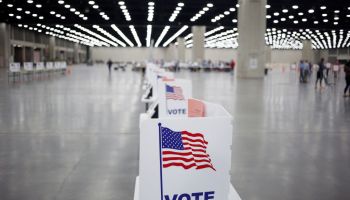
Source: adamkaz / Getty
Black candidates are not waiting for an invitation to lead and are pushing back on the myth of electability.
Sen. Raphael Warnock’s impressive finish in both the November general election and the January runoff showed the power of Black organizers and Black candidates alike. Despite raising less money than his white counterpart, Jon Ossoff, Warnock finished with a greater voter share in the runoff election.
Warnock also benefited from the powerful infrastructure laid in place by Stacey Abrams during her 2018 run for Georgia governor. More Black candidates need the infrastructure, investment, and support to not simply close gaps but clinch wins.
A large field of Black women candidates announced congressional campaigns last year, invested in changing the country, one that they routinely invest in even though it has yet to prove a residual return.
Former North Carolina state Sen. Erica Smith told Politico that Black women aren’t simply a work machine for the Democratic party.
“We vote 98 percent Democrat,” said Smith. “We’ve got to look at that loyal voting bloc, and start supporting them at all levels in leadership.”
Smith is running for Senate, with two other Black women expected to also join the race.
The rise of Black candidates is not due to post-racial fiction where voters see beyond race, but because a coherent message and people-centered approach go a long way. Black candidates and organizers have turned conventional wisdom about what it takes to win elections on its head.
Last year saw the most Black candidates for the U.S. Senate from the south since Reconstruction. Southern Democratic infrastructure unfortunately was not enough to overcome decades of disinvestment. But 2020 candidates for Senate, like Mike Espy and Marquita Bradshaw, persevered and showed that running was possible.
Charles Booker, a former Kentucky state representative, took his message across the bluegrass state finding people with similar stories. From the fight for a living wage to being able to afford needed medicines, Booker and his team gave voters across the state a feeling that their voice mattered. Booker said he is strongly considering running in 2022.
In 2018, Rep. Ayanna Pressley unseated a well-liked white incumbent through organizing and grit. That same year, Rep. Lucy McBath flipped a seat once held by Newt Gingrich.
Black progressive Reps. Jamaal Bowman and Cori Bush unseated long-term incumbents in the 2020 Democratic primaries. Bush is the first person not named Clay to represent Missouri’s 1st Congressional District since 1968.
While the country is being forced to deal with systemic racism and white supremacy, Black candidates are stepping into the void. The investment and support for Black candidates need to match the enthusiasm for Black votes.
Just as political campaigns and operatives are recognizing the decisive power of Black voters, constituents are learning to vote for candidates who put forth the best vision for change regardless of race.
Anoa Changa is a movement journalist and retired attorney based in Atlanta, Georgia. Follow Anoa on Instagram and Twitter @thewaywithanoa.
SEE ALSO:
Charles Booker Lasers In On Beating The Establishment In Possible 2022 Senate Run
2022 Could Have The Blackest Midterm Elections Of All Time was originally published on newsone.com
















